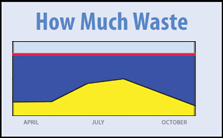Fresh Water Shortages Will Cause the Next Great Global Crisis
Leonardo da Vinci claimed that water is the driving force of all nature.
Unfortunately for our planet, supplies are now running dry at an alarming rate. The world’s population continues to soar, but that rise in numbers has not been matched by an accompanying increase in supplies of fresh water.
The consequences are proving to be profound. Across the globe, reports reveal huge areas in crisis today as reservoirs and aquifers dry up. More than a billion individuals – one in seven people on the planet – now lack access to safe drinking water.
In Sao Paulo, Brazil, home to 20 million people, drought got so bad that residents began drilling through basement floors and car parks to try and reach groundwater.
In California, officials have revealed the state has entered its fourth year of drought. At the same time, per capita water use has continued to rise.
In the Middle East, swaths of countryside have been reduced to desert because of overuse of water. Iran is one of the most severely affected. Heavy overconsumption, coupled with poor rainfall, have ravaged its water resources and devastated its agricultural output.
Similarly, the United Arab Emirates is now investing in desalination plants and waste water treatment units because it lacks fresh water. As Crown Price General Sheikh Mohammed bin Zayed al-Nahyan admitted, “For us, water is now more important than oil.”
The global nature of the crisis is underlined in similar reports from other regions. In south Asia, for example, there have been massive losses of groundwater, which has been pumped up with reckless lack of control over the past decade.
About 600 million people live in the 2,000 sq. km. area that extends from eastern Pakistan, across the northern plains of India and into Bangladesh, and the land is the most intensely irrigated in the world. Up to 75 per cent of farmers rely on pumped groundwater to water their crops and water use is intensifying – at the same time that satellite images shows supplies are shrinking alarmingly.
Changing precipitation and melting snow and ice are already altering hydrological systems in many regions. Glaciers continue to shrink worldwide, affecting towns and villages downstream. The result says the Intergovernmental Panel for Climate Change, is that the fraction of global population experiencing water scarcity is destined to increase throughout the 21st century.
More and more people and nations will have to compete for resources. An international dispute between Egypt and Ethiopia over the latter’s plan to dame the Nile has only recently been resolved.
Jean Chretien, former Canadian Prime Minister and co-chair of the InterAction Council, says, “The future political impact of water scarcity can be devastating. Using water the way we have in the past simply will not sustain humanity in future.”


